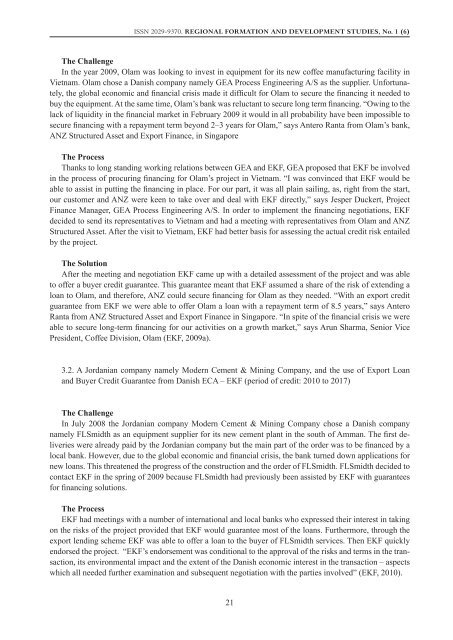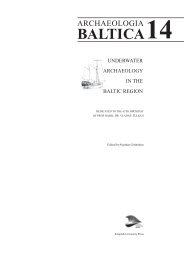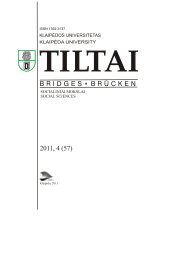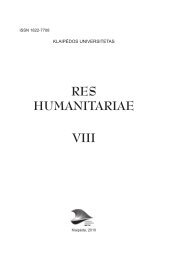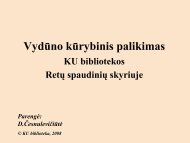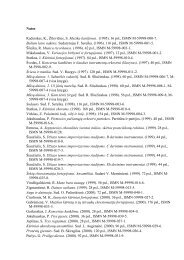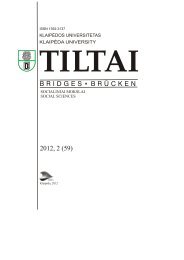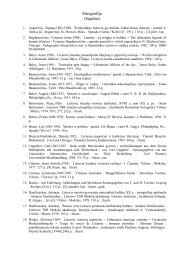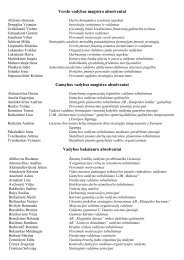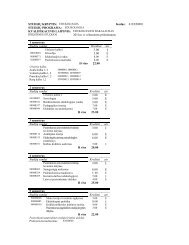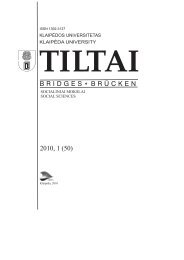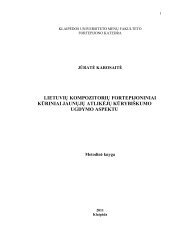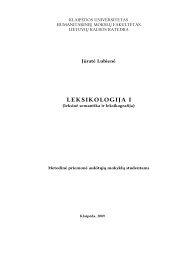Regional Formation 2012,1 - KlaipÄdos universitetas
Regional Formation 2012,1 - KlaipÄdos universitetas
Regional Formation 2012,1 - KlaipÄdos universitetas
You also want an ePaper? Increase the reach of your titles
YUMPU automatically turns print PDFs into web optimized ePapers that Google loves.
ISSN 2029-9370. <strong>Regional</strong> <strong>Formation</strong> and Development Studies, No. 1 (6)<br />
The Challenge<br />
In the year 2009, Olam was looking to invest in equipment for its new coffee manufacturing facility in<br />
Vietnam. Olam chose a Danish company namely GEA Process Engineering A/S as the supplier. Unfortunately,<br />
the global economic and financial crisis made it difficult for Olam to secure the financing it needed to<br />
buy the equipment. At the same time, Olam’s bank was reluctant to secure long term financing. “Owing to the<br />
lack of liquidity in the financial market in February 2009 it would in all probability have been impossible to<br />
secure financing with a repayment term beyond 2–3 years for Olam,” says Antero Ranta from Olam’s bank,<br />
ANZ Structured Asset and Export Finance, in Singapore<br />
The Process<br />
Thanks to long standing working relations between GEA and EKF, GEA proposed that EKF be involved<br />
in the process of procuring financing for Olam’s project in Vietnam. “I was convinced that EKF would be<br />
able to assist in putting the financing in place. For our part, it was all plain sailing, as, right from the start,<br />
our custo mer and ANZ were keen to take over and deal with EKF directly,” says Jesper Duckert, Project<br />
Finance Manager, GEA Process Engineering A/S. In order to implement the financing negotiations, EKF<br />
decided to send its representatives to Vietnam and had a meeting with representatives from Olam and ANZ<br />
Structured Asset. After the visit to Vietnam, EKF had better basis for assessing the actual credit risk entailed<br />
by the project.<br />
The Solution<br />
After the meeting and negotiation EKF came up with a detailed assessment of the project and was able<br />
to offer a buyer credit guarantee. This guarantee meant that EKF assumed a share of the risk of extending a<br />
loan to Olam, and therefore, ANZ could secure financing for Olam as they needed. “With an export credit<br />
guarantee from EKF we were able to offer Olam a loan with a repayment term of 8.5 years,” says Antero<br />
Ranta from ANZ Structured Asset and Export Finance in Singapore. “In spite of the financial crisis we were<br />
able to secure long-term financing for our activities on a growth market,” says Arun Sharma, Senior Vice<br />
President, Coffee Division, Olam (EKF, 2009a).<br />
3.2. A Jordanian company namely Modern Cement & Mining Company, and the use of Export Loan<br />
and Buyer Credit Guarantee from Danish ECA – EKF (period of credit: 2010 to 2017)<br />
The Challenge<br />
In July 2008 the Jordanian company Modern Cement & Mining Company chose a Danish company<br />
namely FLSmidth as an equipment supplier for its new cement plant in the south of Amman. The first deliveries<br />
were already paid by the Jordanian company but the main part of the order was to be financed by a<br />
local bank. However, due to the global economic and financial crisis, the bank turned down applications for<br />
new loans. This threatened the progress of the construction and the order of FLSmidth. FLSmidth decided to<br />
contact EKF in the spring of 2009 because FLSmidth had previously been assisted by EKF with guarantees<br />
for financing solutions.<br />
The Process<br />
EKF had meetings with a number of international and local banks who expressed their interest in taking<br />
on the risks of the project provided that EKF would guarantee most of the loans. Furthermore, through the<br />
export lending scheme EKF was able to offer a loan to the buyer of FLSmidth services. Then EKF quickly<br />
endorsed the project. “EKF’s endorsement was conditional to the approval of the risks and terms in the transaction,<br />
its environmental impact and the extent of the Danish eco nomic interest in the transaction – aspects<br />
which all needed further examina tion and subsequent negotiation with the parties involved” (EKF, 2010).<br />
21


